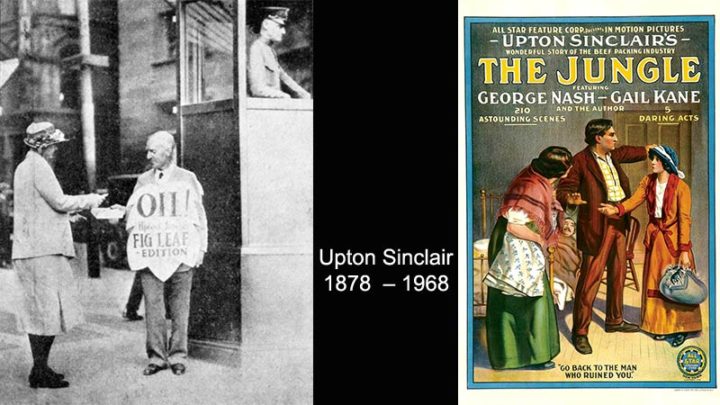
Since the presidency of Ronald Reagan— of whom many republicans still revere— it has become fashionable to view the government as an unnecessary evil. That’s unfortunate. Much, if not most of our federal (and state) government performs necessary and often vital services that can not be done (or done nearly as well) by the private sector.
The Creation of the Food and Drug Administration and the First U.S. Food Safety Laws
Upton Sinclair began his prolific writing career in the early 20th century by documenting the working conditions of meatpackers in Chicago. This was a time when there were no federal laws for meat safety nor laws to protect the health and safety of workers (including young children) whose workplace environments were often appalling.
Thanks to the work of Sinclair, and in particular, to the release of his 1906 book “The Jungle” he’s credited with spurring President Roosevelt to enact the first food safety legislation in the country and the creation of the Food and Drug Administration that remains today. Sinclair, through his work that spanned six decades, helped advance a considerable number of progressive causes. “In some 90 books and innumerable articles over the next six decades, he pushed for progressive causes, like “strong trade unions, abolition of child labor, birth control, Prohibition, utopian Socialism, an honest press, morality in business and industry, vegetarianism, mental telepathy and spiritualism, educational reform and civil liberties,” his [New York Times] obituary said.”
Today’s NYT post revisits that original 1968 obituary: Upton Sinclair, Whose Muckraking Changed the Meat Industry
We still have a long way to go to improve food safety, workplace conditions and many other social injustices that Sinclair ceaselessly fought throughout his life. It’s good though to take stock at how far we have advanced since his day, as well.
Thank you Mr. Sinclair, now let’s finish the job…
Postscript: The Jungle was made into a silent film of the same name (the poster is part of the image at the top) in 1914 and Sinclair bought the rights to it. He appeared in the beginning and end of the movie but unfortunately, like a majority of other silent films of that era, they have been lost to time.
